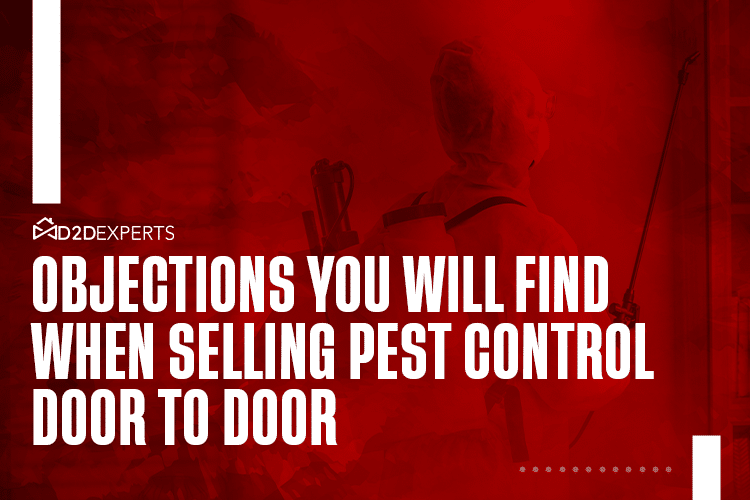Selling pest control door to door is complex. Convincing someone to spend money based on a cold doorstep interaction is a significant challenge. Most people are busy, distracted, and skeptical, they didn’t ask for a sales pitch, and they don’t know or trust you yet. That’s why success in this field requires more than just product knowledge; it demands strategic communication and training in handling door to door pest control objections.
From the moment you knock, you’re facing resistance. Whether it’s “I don’t need it,” “I already have a service,” or “I’m not interested,” these door to door pest control objections are common and predictable. But with the right preparation, they’re not deal-breakers. They’re opportunities.
By learning how to overcome objections with empathy, clarity, and confidence, you can shift the conversation from interruption to value. The goal isn’t to force a sale, it’s to educate the homeowner on what they may be overlooking, and why your pest control service is worth considering right now.
Why should they take time from their busy schedule, listen to you ramble, and then give you some cash? you might negotiate a new pest control contract, but people are happy with their current pest control. Therefore, there are many objections you will find when selling pest control door to door.
The Typical Door to Door Pest Control Sales Technique
When it comes to selling pest control services, success doesn’t just rely on pricing—it depends on how effectively you communicate value. Through proper pest control sales training, your team learns not just how to sell, but how to influence decisions, handle objections, and close with confidence.
In a competitive market, it’s not uncommon for your service to cost more than your competitors’. That’s okay—as long as your customer understands why it’s worth it. It’s your job to convince them that your pest control solution offers more long-term value, reliability, and peace of mind, even if it comes at a slightly higher price point.
Great sales reps know that every “yes” is usually preceded by five “no’s.” That’s the nature of selling. The real skill lies in navigating those “no’s” strategically and patiently.
The solution? A structured approach:
- Pitch confidently: Know your product and how it solves real problems.
- Listen carefully: Understand what the customer truly needs or fears.
- Acknowledge objections: Don’t avoid resistance—address it directly.
- Explore issues: Dig deeper to understand hidden concerns.
- Respond with clarity: Provide relevant info that reinforces trust.
- Close firmly, but respectfully: Reassure and guide them to a decision.
This is where pest control sales training makes all the difference. It equips your reps with the mindset, messaging, and methods they need to consistently turn doubt into trust—and ultimately, convert more leads into loyal customers.
Remember, you’re not just selling a service—you’re protecting homes, health, and peace of mind. That’s a value worth paying for.
Always stay aware that objections are part of the door to door pest control sales. Not everyone is going to sign up for what you offer. D2D Experts offers all-in-one solutions for building and maintaining a reputable door-to-door sales firm.
7 Common Objections While Selling Pest Control Door To Door
You could have the most incredible product known to man, and not everyone will want it. But, unfortunately, objections are part and parcel of door to door pest control sales. Door-to-door sales training and education platforms are excellent for tackling common sales issues.
Some of the most common objections you are likely to hear when selling solar door to door include the following:
- Pest control too expensive: this is probably the most common objection you will hear in door to door pest control sales. Rather than discussing the cost, try to discuss the real-world value of the product.
- There’s nothing in the budget for pest control: this is also a common objection in door to door pest control sales, especially from a business. You can help a willingness to buy by securing funds from senior staff or scheduling a follow-up.
- I have a contract with another pest controller: sometimes prospects feel a little trapped by agreements. You can discuss the current relationship and arrange a switch-over discount.
- I can get pest control cheaper somewhere else: a potential customer usually feels they can get a more affordable product. Highlight the differences and the value in switching.
- I have too much going on to deal with something as trivial as pest control right now: people generally don’t have much time, but it could be a brush-off. So instead, offer a follow-up meeting at their convenience to discuss the product.
- I’ve never heard of this pest control product before: this is a golden opportunity to provide detailed information concerning your product. Highlight the value in a purchase without pitching.
- Pest control is dangerous: word-of-mouth is more powerful than ever with social media and review technology. But take the opportunity to take customer feedback and offer insight into product value Perhaps your product is a less toxic or organic solution.
You build trust and credibility with prospective customers by handling objections correctly when selling pest control door to door, since you offer a positive experience. If they don’t buy from you that day, you always have the chance to schedule a follow-up appointment when they have the time, funds, or authorization to make a purchase.
Objection Handling Techniques In Door To Door Pest Control Sales
As an elite salesperson, leaving an objection unaddressed is one of the worst mistakes you can make in door to door pest control sales. It is best if you handle objections as early as possible throughout your technique when selling pest control door to door. The longer a potential customer retains a negative opinion of a product like pest control, the less likely they are to be convinced. Their opposing views become reinforced, and your job becomes much more complicated.
Therefore, you should welcome objections immediately and never take a defensive stance about a product or service. Directly going on the defensive risks alienating a prospect and will strengthen their negative perception. The best door to door pest control sales approach is to be proactive in dealing with objections and tackling them head-on. You can do this with the following methods:
FAQS
Q1: How should I involve a prospect in the discussion about pest control products?
A: Ask for their opinion early in the conversation. For instance, you might say, “Is there anything specific that might hold you back from moving forward with a pest control service?” This not only encourages engagement but also reveals potential objections you can address.
Q2: Why is active listening important in pest control sales?
A: Active listening helps you understand the customer’s real concerns and level of interest. By paying close attention and reading between the lines, you can uncover what’s truly influencing their decision—whether it’s budget, timing, or prior experiences.
Q3: What does it mean to repeat a customer’s statements back to them?
A: Repeating or paraphrasing their concerns validates their thoughts and shows you’re paying attention. For example, “So if I understand correctly, you’re worried the treatment might not be long-lasting?” This helps clarify misunderstandings and builds trust.
Q4: How can I overcome common objections during a sales pitch?
A: Once objections are clearly identified, tailor your response to meet their concerns. If price is an issue, emphasize the long-term savings and health benefits. Show how your service solves their problem cost-effectively and reliably.
Q5: What should I do if the prospect isn’t ready to commit?
A: Don’t end the conversation abruptly. Instead, ask for a follow-up opportunity. Say something like, “Would it be okay if I check back with you next week?” or gather contact details to schedule a future appointment when they’re better prepared.
In Summary
Learning a pest control sales pitch and repeating it time and time again is the easiest part of door-to-door pest control sales. Most of the time, it’s more akin to a script. But every potential client is different. Some will immediately switch if you are lucky, and some require a little more convincing and object to your product. By using some of the objection handling techniques highlighted, you can overcome some of the biggest hurdles in door to door pest control sales that prevent your ongoing success.


